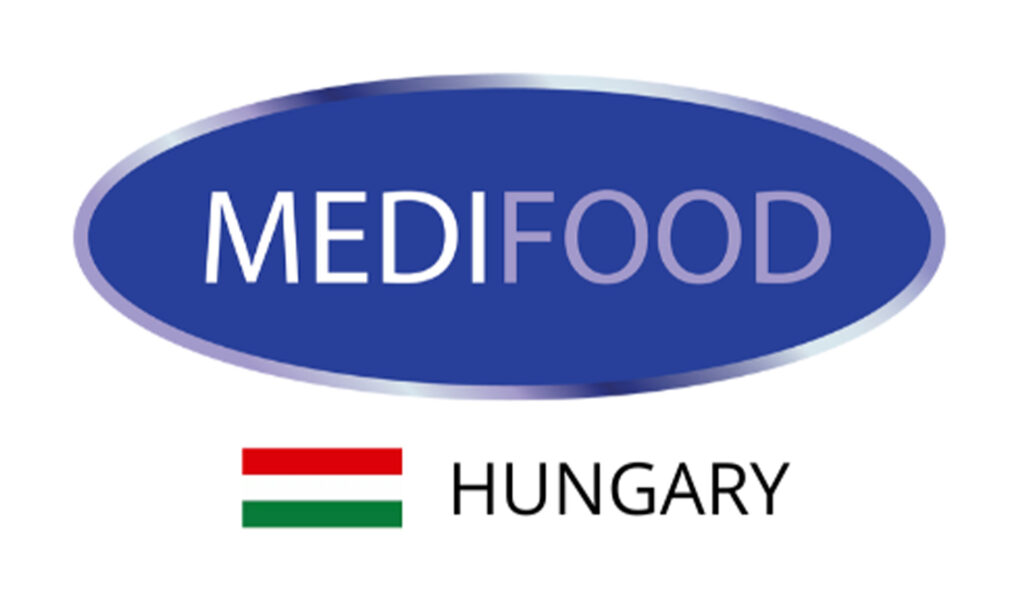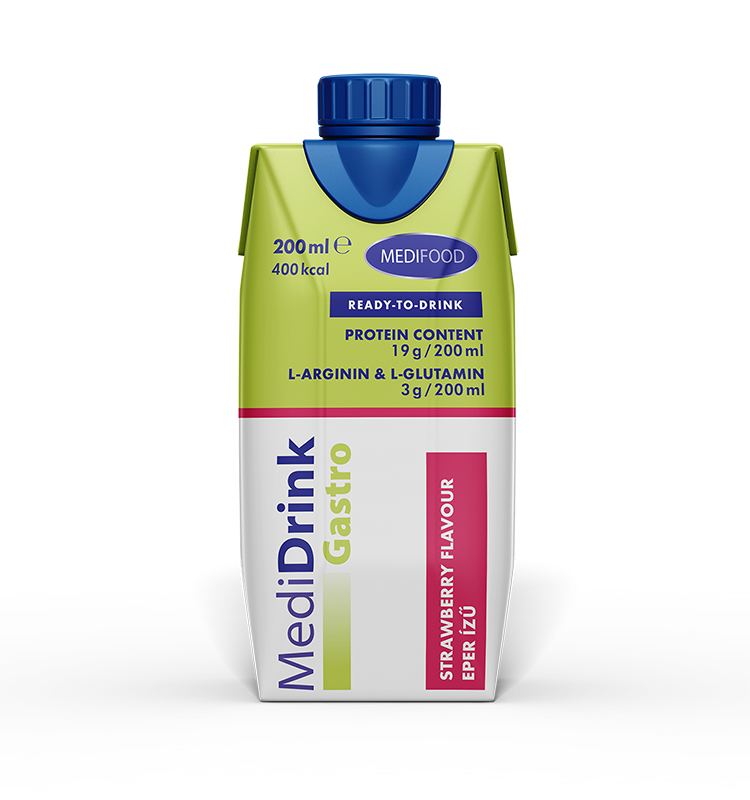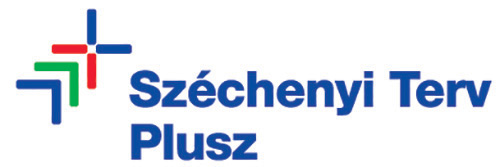MediDrink Gastro
Betegséghez kapcsolódó alultápláltság
A betegséghez kapcsolódó alultápláltság évek óta jelentős, de aluldimenzionált probléma, amely mintegy 20 millió beteget érint az Európai Unióban, és 33 millió beteget Európa valamennyi országában (Ljungqvist et al. 2009, Ljungqvist et al. 2010). A betegséghez kapcsolódó alultápláltság a betegség és a szükségleteknek nem megfelelő táplálék-bevitel együttes következményeként alakul ki (Naber et al. 1997). Következésképp, a kezelésnek nem csak magát a betegséget, hanem a klinikai táplálást is magában kell foglalnia.
Betegséghez kapcsolódó alultápláltság gyulladásos bélbetegségben
A gyulladásos bélbetegségben szenvedők tápláltsági állapota több szinten is elmarad az egészségesekétől (Saunders & Smith 2010, Hartman et al. 2009, Bischoff et al. 2020). Az alultápláltság Crohn-betegségben a betegek 16-85%-ában van jelen (Mijac et al. 2010, Casanova et al. 2017, Balestrieri et al. 2020). Az alultápláltság kezelése kiemelt fontosságú, mivel számos negatív hatása van a gyulladásos bélbetegség lefolyására (Guagnozzi et al. 2012, Bischoff et al. 2020, Mijac et al. 2010, Casanova et al. 2017, Nguyen et al. 2008, Balestrierei et al. 2020).
Klinikai táplálás gyulladásos bélbetegségben
Amennyiben az emésztőrendszer biztonságosan használható, az ezen keresztüli táplálást kell előnyben részesíteni Crohn-betegeknél és colitis ulcerosában szenvedőknél (Guagnozzi et al. 2012). Magas fehérjetartalmú szemi-elementáris diéta javítja a tápláltsági állapotot aktív fázisú Crohn-betegségben (Ferreiro et al. 2021).
Alacsony szénhidrát-tartalmú táplálás a nyálkahártya állapotának és a klinikai tünetek javulását indukálja Crohn-betegeknél (Lutz et al. 1986), valamint csökkenti a Lactobacillus növekedést és ennek következményeit rövid bél szindrómás betegeknél (Bongaerts & Severijnen. 2006). Az alacsony szénhidrát- és magas zsírtartalmú étrend biztonságos (Ruth et al. 2013, Dehghan et al. 2017, Niswender et al. 2018).
Az omega-3 zsírsavak többféle jótékony hatást mutatnak gyulladásos bélbetegségben (Wiese et al. 2011, Sung et al. 2013, Belluzzi et al. 1996, Aslan A. & Triadafilopoulos G. 1992, Scaioli et al. 2018). Gyulladás-ellenes hatásánál fogva (Rautava et al. 2011) a tejfehérjéből származó transzformáló növekedési faktor (TGF)-β tartalmú étrend csökkenti a betegség aktivitási indexet és a CRP szintet Crohn-betegségben (Ferreira et al. 2020).
A közepes szénláncú zsírsavak (MCT) zsírfelszívódási zavar esetén is hasznosítható energiaforrást jelentenek (Sankararaman & Sferra 2018), és immunmoduláns hatásokkal is rendelkezhetnek (Cabre & Domenech. 2012).
A glutamin és az arginin aminosavak, amelyeknek fontos szerepet tulajdonítanak a bélnyálkahártya integritásának fenntartásában (Kim & Kim 2017, Fritz 2013).
Krónikus cinkhiányban megnő a gyulladásos citokinek termelése, amely nagyszámú gyulladásos betegség kimenetelét befolyásolhatja (Bonaventura et al. 2015). Megfelelő szelénbevitel csökkentheti a krónikus bélgyulladást az emberi szervezetben (Speckmann & Steinbrenner. 2014), és elősegíti a protektív bél microbiota kialakulását, amely indirekt módon segítheti a gyulladásos bélbetegség javulását (Ala & Kheyri. 2021).
Kizárólagos enterális táplálás
A kizárólagos enterális táplálás első vonalbeli kezelésként ajánlott a remisszió indukálására 17 éves vagy fiatalabb, aktív luminális Crohn-betegségben szenvedőknél (Bischoff et al. 2020, Ashton et al. 2019, van Rheenen et al. 2020). A kizárólagos enterális táplálással elért remissziós ráta 60-80% (Bischoff et al. 2020, Ashton et al. 2019, van Rheenen et al. 2020). Megfelelő compliance mellett a kizárólagos enterális táplálás felnőttkori Crohn-betegségben is hatékony lehet (Mitrev et al. 2021).
MediDrink Gastro
A MediDrink Gastro 2,0 kcal/ml energiatartalmú, teljes értékű, laktóz- és gluténmentes, speciális gyógyászati célra szánt élelmiszer Crohn-betegség aktív fázisának diétás ellátására, mely alkalmazható kizárólagos enterális táplálásként és gyulladásos bélbetegség diétás ellátására kiegészítő táplálásként.
A MediDrink Gastro napi adagját a kezelőorvosnak kell meghatároznia.
A MediDrink Gastro 3 év alatti gyermekeknek, valamint galaktozémiában és örökletes fruktóz intoleranciában (fruktozémiában) szenvedő betegeknek nem adható.
A MediDrink Gastro jelenleg 3 ízben (csokoládé, eper, vanília) van forgalomban.
Compliance, biztonságosság, tolerabilitás
A compliance szignifikánsan magasabb ≥2 kcal/ml energia-tartalmú iható tápszerek esetén a standard 1,5 kcal/ml energia-tartalmú iható tápszerekhez képest (Hubbard et al. 2012). Az iható tápszerek ízletessége a betegek számára szignifikánsan magasabb tejfehérje-alapú tápszerek esetén (Darmon et al. 2008).
A MediDrink Gastro diabetes mellitus társbetegség esetén is adható (Medifood Data on file 2022).
Irodalom
[Complete therapy with clinical nutrition] – Nutricia, 15th June 2016.
[ONS index] 2014. Vidal Hungary Kft.
Argiles JM. et al. Cachexia: a problem of energetic inefficiency. J Cachexia Sarcopenia Muscle 2014;5:279-86.
Balestrieri P. et al. Nutritional Aspects in Inflammatory Bowel Diseases. Nutrients 2020;12:372.
Bonaventura P. et al. Zinc and its role in immunity and inflammation. Autoimmun Rev 2015;14:277-285.
Elia M. et al. To screen or not to screen for adult malnutrition? Clin Nutr 2005;24:867-84.
Fajcsák Zs. and Lelovics Zs. [Glycemic index and glycemic load]. Új Diéta 2006;4:28-9.
Freijer K. et al. The economic costs of disease related malnutrition. Clin Nutr 2013;32:136-41.
Fritz JH. Arginine cools the inflamed gut. Infect Immun 2013;81:3500-2.
Hite AH. et al. Low-carbohydrate diet review: shifting the paradigm. Nutr Clin Pract 2011;26:300-8.
https://www.nestlehealthscience.co.uk/sites/default/files/2020-07/modulen-datacard-july-2019.pdf accessed on 23rd November 2023
https://www.fresubin.be/fr-be/produits/fresubin-db-drink/ accessed on 7th November 2023
Ljungqvist O. et al. The European fight against malnutrition. Clin Nutr 2010;29:149-50.
Ljungqvist O. Man FD. Under nutrition: a major health problem in Europe. Nutr Hosp 2009;24:369-70.
Medifood data on file 2022
Sankararaman S. & Sferra TJ. Are We Going Nuts on Coconut Oil? Curr Nutr Rep 2018;7:107-115.
Saunders .J & Smith T. Malnutrition: causes and consequences. Clin Med (Lond) 2010;10:624-7.
Stratton RJ. et al. Disease-related Malnutrition: An Evidence-based Approach to Treatment. CABI Publishing, 2003.
Tisdale MJ et al. Cancer cachexia. Langenbecks Arch Surg 2004;389:299-305.
http://www.fresenius-kabi.co.uk/ (accessed on 15th November 2023)
www.fresenius-kabi.ie (accessed on accessed on 15th November 2023)










